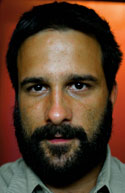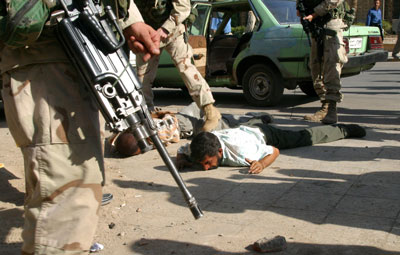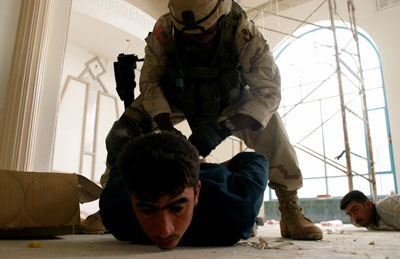 |
 |
Saddam's Palace
November 2003
|
 |
|||||||||
|
I'm sitting in Ar-Ramadi, Iraq with the Florida National Guard. Waiting to go out on a night time raid. We live in one of Saddam's palaces. M16, AT4's, digital cameras, personal computers, and Kevlar are scattered around the palace floors. A group of soldiers watch a Bruce Willis film on the 42-inch TV and eat microwave popcorn. Others are playing the latest shoot 'em up war video game and one lone officer plays the violin in the hallway. Mortar rounds explode nearby every night. The threats of roadside bombs and RPG attacks are real. In the morning we are moving closer to Fallujah to conduct raids on the Iraqi resistance. The MRE's are by far better than any local food I have eaten in about three months. When I eat local I tend to pop Imodium like vitamins.
I wanted to go to Iraq for many months but could not finance the story and lacked all the digital gizmos required in the 21st century. I approached the military for a free flight and Polaris Images for a satellite phone. The 101st Airborne Division offered to fly me into Iraq directly from the U.S. and my agent J.P. Pappis of Polaris Images gave me the Bgan satellite. With under 3,000 dollars in my pocket I kissed my wife and baby goodbye and set out for Iraq. With such a small sum of money I can not afford translators or personal security agents from England like so many other journalists have. There are three reasons why I came to Iraq. As a father I must provide for my child. As a journalist I want to know the truth about the war in Iraq. And as a professional photographer I want to work on developing my Web site http://fotoking.com.
The best access I've had since I've been here has been while I've been embedded with the National Guard. I think it has a lot to do with the unit I've been with. The men of the National Guard unit I've been photographing tend to be more mature, have careers of their own back home and have opinions of their own, too. The unit has been very eager to show us both the good and the bad. There have been many opportunities to photograph the effects of bombs exploding in Baghdad. If you arrive at the blast site 30 minutes after the explosion you will see and photograph nothing. This is because the Iraqi police and the U.S. military will not let you enter into the blast zone. I have made little blood money in this war. Most of my assignments and picture sales have been when I work as a unilateral journalist. The situation in Iraq is an economic disaster. Many Iraqis hate the occupational forces and resistance is getting stronger and more tactical with each attack. The new Saddam free Iraq is free of Saddam but is becoming a dangerous battlefield for guerrilla warfare. The only thing I have understood in the three months that I've been in Iraq is that the American military will be in country for many years to come.
© Robert King
|
||||||||||
|
Write a Letter to the Editor
Join our Mailing List
© The Digital Journalist
|


